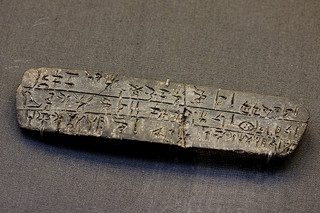Decoding Greek: What Greek people say and what they really mean Posted by Ourania on Dec 4, 2014 in Vocabulary
Sometimes there is a big difference between what people say and what they actually mean. If one wants to communicate efficiently in a foreign language it is very important to be able to tell the difference between the literal and the actual meaning of a sentence in the target language. Although, we have the reputation of being sincere and abrupt, in some cases we hide what we really want to say because we don’t eant to hurt other people’s feelings, because we want to avoid arguments or because we just want to lie. Below, there is a list of phrases and short dialogues with their meanings. Don’t take them too seriously, except the ones related to time.
1. «Να τα πούμε αύριο-μεθαύριο.» (Na ta poume avrio methavrio)
«Ναι, βέβαια.» (Ne, vevea)
“Let’s meet one of these days.” = Maybe we’ll meet, maybe we won’t.
“Yes, sure.” = Whatever…
2. Τα λέμε αύριο στις δέκα. (Ta leme avrio stis deka)
Talk to you tomorrow at 10. = Talk to you tomorrow at 10:30 or maybe at 11…
3. «Πώς σου φάνηκε ο Γιάννης;» (Pos sou fanike o Yanis)
«Καλός είναι.Φαίνεται σοβαρός και ώριμος.» (Kalos ine. Fenetai sovaros kai orimos)
“What do you think of Yannis?»
“He’s good. He looks serious and mature.” = He’s old enough to be your father.
4. Έχει λίγη κίνηση. Θα κάνουμε κανένα τεταρτάκι να φτάσουμε. (Ehei ligi kinisi. Tha kanoume kanena tetartaki na ftasoume)
There’s little traffic. It will take us about a quarter to get there. = There’s traffic jam. We’ll be lucky if we get there by the end of the day.
5. Θα σκεφτώ την προσφορά σας και θα σας τηλεφωνήσω. (Tha skefto tin prosfora sas kai tha sas tilefoniso)
I’ll think about your offer and I’ll call you. = I’m not interested and I won’t call you.
6. Ελάτε πάλι αύριο και θα δούμε τι μπορούμε να κάνουμε. (Elate pali avrio kai tha doume ti boroume na kanoume)
Come back tomorrow and we’ll see what we can do. = Come back in a week and we’ll see if there’s anything we can do.
7. Δεν είναι ότι δε μου αρέσεις, απλώς χρειάζομαι χρόνο. (Den einai oti den mou areseis aplos hreiazomai hrono)
It’s not that I don’t like you, I just need time. = I want to break up with you but I cannot tell you that directly.
8. Θέλω πολύ να δουλέψω αλλά δε βρίσκω κάτι ανάλογο με τα προσόντα μου. (Thelo poli na doulepso alla de vrisko kati analogo me ta prosonta mou)
I really want to get a job but my qualifications go beyond any job requirements (literally). = I don’t want to get a job because I’m lazy on principle.
9. «Πώς τα πάει ο Γιώργος στο σχολείο;» (Pos ta paei o Yorgos sto sholeio?)
«Ε, ξέρεις… το γυμνάσιο είναι δύσκολο, οι καθηγητές απαιτητικοί…» (E, ksereis…to gimnasio einai diskolo, oi kathigites apetitiki…)
“How is George doing in school?”
“You know… high school is difficult, the teachers are demanding… = He’s doing really bad.
10. «Θέλεις να σε γνωρίσω στον Κώστα;» (Theleis na se gnoriso ston Kosta?)
«Ναι, αμέ! Είναι ωραίος;» (Nai, ame! Einai oraios?)
«Είναι πολύ καλό παιδί.» (Einai poli kalo paidi)
“Do you want me to introduce you to Kostas?”
“Yes, sure! Is he handsome?”
“He’s a really nice guy”. = He’s ugly.

Build vocabulary, practice pronunciation, and more with Transparent Language Online. Available anytime, anywhere, on any device.
About the Author: Ourania
Ourania lives in Athens. She holds a degree in French Literature and a Master’s degree in Special Education for Children. Since 2008, she has been teaching Greek to foreigners.






Comments:
Helene:
Hahahaha!!!! This is very funny!!!